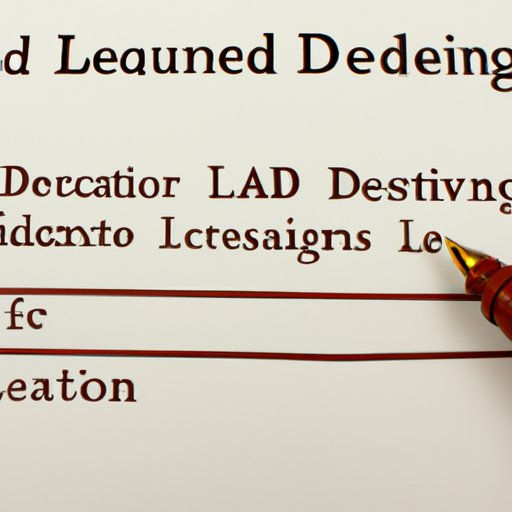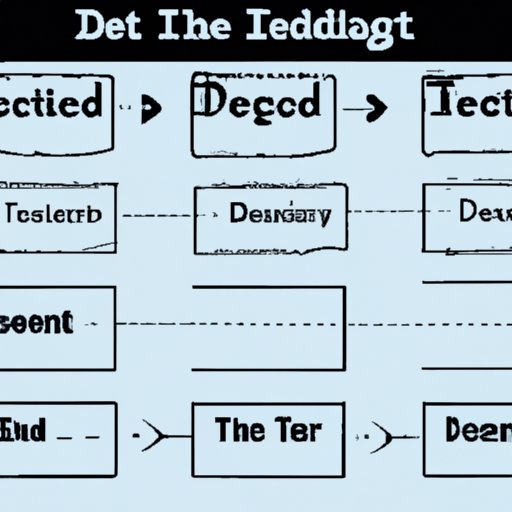Introduction
A deed is a legal document that transfers ownership of a piece of property from one person to another. When someone purchases a home or other real estate, they must have their deed recorded with the local government in order to officially transfer ownership. The process of deed recording can vary depending on the jurisdiction, but understanding the timeline can help ensure that the transfer of ownership is completed in a timely manner.

Exploring the Length of Time Required to Record a Deed
The length of time required to record a deed can vary depending on several factors. In some cases, it may take as little as two days for the deed to be recorded. However, if there are any issues with the paperwork or if there is a backlog of documents at the recording office, the process can take much longer. Additionally, some states require additional steps such as notarization or publication in a local newspaper, which can further extend the timeline.
In addition to potential delays, there are also potential issues that can arise during the deed recording process. For instance, if the deed fails to meet the requirements for recording, such as having all of the necessary signatures or being properly notarized, then the deed will not be accepted by the recorder’s office. In these cases, it may be necessary to revise the paperwork and resubmit it, which can further delay the process.
How Long Does it Take for Your Deed to Be Recorded?
Before attempting to record a deed, it is important to research the laws in your area. Different states and jurisdictions have different requirements for deed recording, so it is important to understand what is expected of you. Once you have researched the local laws, you should be able to calculate an estimated delivery time. Generally speaking, it should take no more than two weeks for your deed to be recorded.
Understanding the Timeline for Deed Recording
The timeline for deed recording typically involves several steps. First, the deed must be prepared. This includes filling out the necessary paperwork and making sure that all of the signatures are included. Next, the deed must be submitted to the recorder’s office. Depending on the jurisdiction, this may involve sending the paperwork via mail or submitting it electronically. Once the deed has been received, it must be reviewed and approved by the recorder before it can be officially recorded.
Once the deed has been approved, it is usually recorded within 24-48 hours. The recorder’s office will then provide a copy of the recorded deed, which serves as proof of the transfer of ownership. The entire process typically takes between one and two weeks, though it can take longer depending on the jurisdiction.

The Process and Timeline of Deed Recording
The process of deed recording can be broken down into several steps:
- Preparing documents: This includes filling out the necessary paperwork and making sure that all of the signatures are included.
- Submitting documents: Depending on the jurisdiction, this may involve sending the paperwork via mail or submitting it electronically.
- Waiting for approval: Once the deed has been received, it must be reviewed and approved by the recorder before it can be officially recorded.
Once the deed has been approved, it is usually recorded within 24-48 hours. The recorder’s office will then provide a copy of the recorded deed, which serves as proof of the transfer of ownership. The entire process typically takes between one and two weeks, though it can take longer depending on the jurisdiction.

A Guide to Recording Deeds: Timing and Expectations
Knowing what to expect when recording a deed can help ensure that the process goes as smoothly as possible. Here are some tips for speeding up the process:
- Be prepared: Make sure that all of the necessary paperwork is filled out correctly and that all of the signatures are included.
- Research local laws: Understand the requirements for recording deeds in your area.
- Submit documents early: Submitting documents early can help avoid any delays caused by a backlog at the recorder’s office.
- Follow up: If you haven’t received a response within a reasonable amount of time, follow up with the recorder’s office to check on the status of your deed.
Conclusion
Deed recording is an important part of the real estate process and can take anywhere from a few days to a few weeks to complete. Understanding the timeline for deed recording can help ensure that the transfer of ownership is completed in a timely manner. Factors such as local laws, paperwork preparation, and potential delays can all affect the timeline, so it is important to do your research and be prepared. By following these tips and understanding the process, you can ensure that your deed is recorded quickly and efficiently.
(Note: Is this article not meeting your expectations? Do you have knowledge or insights to share? Unlock new opportunities and expand your reach by joining our authors team. Click Registration to join us and share your expertise with our readers.)
